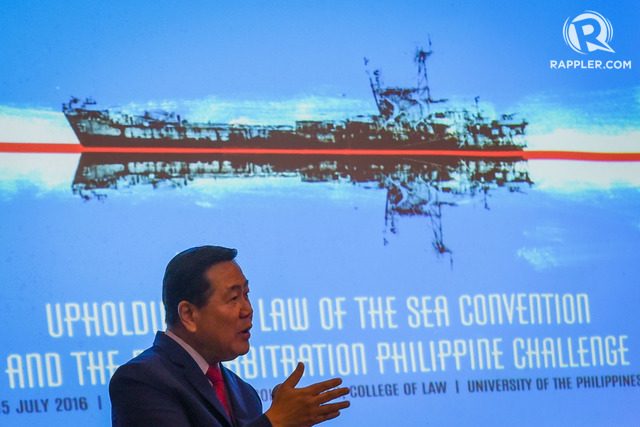SUMMARY
This is AI generated summarization, which may have errors. For context, always refer to the full article.

MANILA, Philippines – After recent sightings of several Chinese vessels in the Philippines’ exclusive economic zone (EEZ), Supreme Court Senior Associate Justice Antonio Carpio said the Philippine government must pass a law designating sea lanes in the country’s waters.
On Thursday, August 22, Carpio said that such a measure would aid in the tracking of foreign ships passing through Philippine waters as it can “require foreign ships exercising the right to archipelagic sea lane passage to turn on their Automatic Identification System (AIS) and for submarines to surface and show their flag.” (READ: Carpio: PH must compel foreign ships to keep trackers on when passing through)
President Rodrigo Duterte earlier warned of consequences should foreign ships pass through the Philippines’ territorial waters without securing clearance from the government.
“The President is putting on notice that beginning today, all foreign vessels passing our territorial waters must notify and get clearance from the proper government authority well in advance of the actual passage,” Presidential Spokesperson Salvador Panelo said on Tuesday, August 20.
“Either we get compliance in a friendly manner or we enforce it in an unfriendly manner,” he added, without elaboration.
However, Carpio pointed out that under the United Nations Convention on the Law of the Sea, coastal states – in this case the Philippines – cannot require foreign vessels to seek “prior permission or prior notification” when exercising innocent passage.
“What the Philippines should do is to pass the archipelagic sea lanes passage bill so the President can designate the sea lanes where foreign merchant ships and warships could pass…. The bill has been pending in Congress for years now. The President should certify it as an urgent measure,” Carpio said.
The Philippine maritime zones bill was listed among the Duterte Cabinet’s priority measures that it wanted passed in the 18th Congress. The proposed measure, previously filed by former senator Antonio Trillanes IV, defines the Philippines’ maritime zones and the country’s rights over them with the goal of averting disputes with foreign vessels.
In the House of Representatives, Magdalo Representative Manuel Cabochan filed a version of the bill on July 1. A similar bill has not yet been filed in the Senate.
In 2019 alone, there have been at least 12 reported sightings and incidents involving Chinese vessels in Philippine waters. These included instances where China’s warships passed through areas like the Sibutu Strait in Tawi-Tawi, an international waterway where foreign ships have the “right of innocent passage.”
It was Carpio who first sounded the alarm on Chinese ships passing by Tawi-Tawi. He hit China’s double standard as the superpower has always driven away ships and aircraft passing through or over territories it claims to be theirs.
Defense Secretary Delfin Lorenza said the growing list of Chinese vessels spotted in Philippine waters is “alarming.” In response, the Department of Foreign Affairs issued a series of diplomatic protests against China.
Philippines’ maritime zones in West PH Sea
While Duterte’s warning covers foreign vessels’ passage in territorial waters which extend 12 nautical miles from the Philippines’ baselines, Carpio pointed out that the country has jurisdiction to more than that.
Aside from territorial seas, Carpio said the Philippines has “exclusive sovereign rights over natural resources in the water column and seabed” of the EEZ. The EEZ extends beyond territorial seas up to 200 nautical miles from the country’s baseline.
Meanwhile, Carpio said the Philippines also has “exclusive sovereign rights to the natural resources in the seabed of our extended continental shelf.” This area extends further beyond the EEZ up to 350 nautical miles from the country’s baselines.
In both the Philippines’ EEZ and continental shelf, Carpio said the country has “exclusive jurisdiction to put up artificial structures.”
He added, “We should make clear to our people, and to the world, that the West Philippine Sea refers to waters in the South China Sea over which the Philippines has sovereignty, sovereign rights or jurisdiction.” – Rappler.com
Add a comment
How does this make you feel?
There are no comments yet. Add your comment to start the conversation.